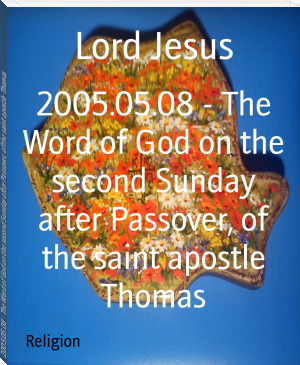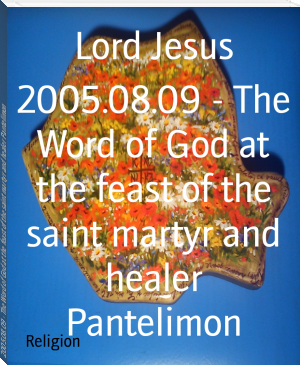The Story of a Soul - Saint Thérèse de Lisieux (best color ereader .TXT) 📗

- Author: Saint Thérèse de Lisieux
- Performer: -
Book online «The Story of a Soul - Saint Thérèse de Lisieux (best color ereader .TXT) 📗». Author Saint Thérèse de Lisieux
What happiness to be so entirely hidden that no one gives us a thought—to be unknown even to those with whom we live! My little Mother, I long to be unknown to everyone of God's creatures! I have never desired glory amongst men, and if their contempt used to attract my heart, I have realized that even this is too glorious for me, and I thirst to be forgotten.
The Glory of Jesus—this is my sole ambition. I abandon my glory to Him; and if He seem to forget me, well, He is free to do so since I am no longer my own, but His. He will weary sooner of making me wait than I shall of waiting.
VIII[One day when Soeur Thérèse was suffering acutely from feverishness, one of the Sisters urged her to help in a difficult piece of painting. For a moment Thérèse's countenance betrayed an inward struggle, which did not escape the notice of Mother Agnes of Jesus. That same evening Thérèse wrote her the following letter.]
May 28, 1897.
MY DEAREST MOTHER,—I have just been shedding sweet tears—tears of repentance, but still more of thankfulness and love. To-day I showed you the treasure of my patience, and how virtuous I am—I who preach so well to others! I am glad that you have seen my want of perfection. You did not scold me, and yet I deserved it. But at all times your gentleness speaks to me more forcibly than would severe words. To me you are the image of God's Mercy.
Sister N., on the contrary, is more often the image of God's severity. Well, I have just met her, and, instead of passing me coldly by, she embraced me and said: "Poor little Sister, I am so sorry . . . I do not want to tire you; it was wrong of me to ask your help; leave the work alone." In my heart I felt perfect sorrow, and I was much surprised to escape all blame. I know she must really deem me imperfect. She spoke in this way because she thinks I am soon to die. However that may be, I have heard nothing but kind and tender words from her; and so I consider her most kind, and myself an unamiable creatures.
When I returned to our cell, I was wondering what Jesus thought, when all at once I remembered His words to the woman taken in adultery: "Hath no man condemned thee?"[2] With tears in my eyes, I answered Him: "No one, Lord, . . . neither my little Mother—the image of Thy Mercy—nor Sister N., the image of Thy Justice. I feel that I can go in peace, because neither wilt Thou condemn me."
I confess I am much happier because of my weakness than if—sustained by grace—I had been a model of patience. It does me so much good to see that Jesus is always sweet and tender towards me. Truly it is enough to make me die of grateful love.
My little Mother, you will understand how this evening the vessel of God's Mercy has overflowed for your child. . . . Even now I know it! Yea, all my hopes will be fulfilled . . .
VERILY THE LORD WILL WORK WONDERS FOR ME, AND THEY WILL INFINITELY SURPASS MY BOUNDLESS DESIRES. _____________________________
[1] Soeur Thérèse here alludes to the probable opinion of theologians that—as in Baptism—all stain of sin is removed and all temporal punishment for sin remitted, by the vows taken on the day of religious profession. [Ed.]
[2] John 8:10.
_____________________________
LETTERS TO SISTER MARY OF THE SACRED HEART IFebruary 21, 1888.
MY DEAR MARIE,—You cannot think what a lovely present Papa made me last week; I believe if I gave you a hundred or even a thousand guesses you would never find out what it was. Well, my dear Father bought me a new-born lamb, all white and fleecy. He said that before I entered the Carmel he wanted me to have this pleasure. We were all delighted, especially Céline. What touched me more than anything was Papa's thoughtfulness. Besides, a lamb is symbolic, and it made me think of Pauline.
So far, so good, but now for the sequel. We were already building castles in the air, and expected that in two or three days the lamb would be frisking round us. But the pretty creature died that same afternoon. Poor little thing, scarcely was it born when it suffered and died. It looked so gentle and innocent that Céline made a sketch of it, and then we laid it in a grave dug by Papa. It appeared to be asleep. I did not want the earth to be its covering, so we put snow upon our pet, and all was over.
You do not know, dearest Godmother, how this little creature's death has made me reflect. Clearly we must not become attached to anything, no matter how innocent, because it will slip from our grasp when least expected; nothing but the eternal can content us.
II(Written during her retreat before receiving the habit.)
January 8, 1889.
Your little Lamb—as you love to call me, dearest sister—would borrow from you some strength and courage. I cannot speak to Our Lord, and He is silent too. Pray that my retreat may be pleasing to the Heart of Him Who alone reads the secrets of the soul.
Life is full of sacrifice, it is true, but why seek happiness here? For life is but "a night to be spent in a wretched inn," as our holy Mother St. Teresa says. I assure you my heart thirsts ardently for happiness, but I see clearly that no creature can quench that thirst. On the contrary, the oftener I would drink from these seductive waters the more burning will my thirst become. I know a source where "they that drink shall yet thirst,"[1] but with a delicious thirst, a thirst one can always allay. . . . That source is the suffering known to Jesus only.
IIIAugust 14, 1889.
You ask for a word from your little Lamb. But what shall I say? Is it not you who have taught me? Remember those days when I sat upon your knee, and you talked to me of Heaven.
I can still hear you say: "Look at those who want to become rich, and see how they toil to obtain money. Now, my little Thérèse, through every moment of the day and with far less trouble, we can lay up riches in Heaven. Diamonds are so plentiful, we can gather them together as with a rake, and we do this by performing all our actions for the love of God." Then I would leave you, my heart overflowing with joy, and fully bent on amassing great wealth.
Time has flown since those happy hours spent together in our dear nest. Jesus has visited us, and has found us worthy to be tried in the crucible of suffering. God has said that on the last day "He will wipe away all tears from our eyes,"[2] and no doubt the more tears there are to dry, the greater will be the happiness.
Pray to-morrow for the little one who owes you her upbringing, and who, without you, might never have come to the Carmel.
IV(During her retreat before profession)
September 4, 1890.
The heavenly music falls but faintly on the ear of your child, and it has been a dreary journey towards her Bridal Day. It is true her Betrothed has led her through fertile lands and gorgeous scenery, but the dark night has prevented her admiring, much less revelling in, the beauty all around. Perhaps you think this grieved her. Oh, no! she is happy to follow her Betrothed for His own sake, and not for the sake of His gifts. He is so ravishingly beautiful, even when silent—even when concealed. Weary of earthly consolation, your little child wishes for her Beloved alone. I believe that the work of Jesus during this retreat has been to detach me from everything but Himself. My only comfort is the exceeding strength and peace that is mine. Besides, I hope to be just what He wills I should be, and in this lies all my happiness.
Did you but know how great is my joy at giving pleasure to Jesus through being utterly deprived of all joy! . . . . Truly this is the very refinement of all joy—joy we do not feel.
VSeptember 7, 1890.
To-morrow I shall be the Spouse of Jesus, of Him Whose "look was as it were hidden and despised."[3] What a future this alliance opens up! How can I thank Him, how render myself less unworthy of so great a favour?
I thirst after Heaven, that blessed abode where our love for Jesus will be without bounds. True, we must pass through suffering and tears to reach that home, but I wish to suffer all that my Beloved is pleased to send me; I wish to let Him do as He wills with His "little ball." You tell me, dearest Godmother, that my Holy Child is beautifully adorned for my wedding-day;[4] perhaps, however, you wonder why I have not put new rose-coloured candles. The old ones appeal to me more because they were lighted for the first time on my clothing-day. They were then fresh and of rosy hue. Papa had given them to me; he was there, and all was joyful. But now their tint has faded. Are there yet any rose-coloured joys on earth for your little Thérèse? No, for her there are only heavenly joys; joys where the hollowness of all things gives place to the Uncreated Reality.
VIMY DEAREST SISTER,—I do not find it difficult to answer you. . . . How can you ask me if it be possible for you to love God as I love Him! My desire for martyrdom is as nothing; it is not to that I owe the boundless confidence that fills my heart. Such desires might be described as spiritual riches, which are the unjust mammon,[5] when one is complacent in them as in something great. . . . These aspirations are a consolation Jesus sometimes grants to weak souls like mine—and there are many such! But when He withholds this consolation, it is a special grace. Remember these words of a holy monk: "The martyrs suffered with joy, and the King of Martyrs in sorrow." Did not Jesus cry out: "My father, remove this chalice from Me"?[6] Do not think, then, that my desires are a proof of my love. Indeed I know well that it is certainly not these desires which make God take pleasure in my soul. What does please Him is to find me love my littleness, my poverty: it is the blind trust which I have in His Mercy. . . . There is my sole treasure, dearest Godmother, and why should it not be yours?
Are you not ready to suffer all that God wills? Assuredly; and so if you wish to know joy and to love suffering, you are really seeking your own consolation, because once we love, all suffering disappears. Verily, if we were to go together to martyrdom, you would gain great merit, and I should have none, unless it pleased Our Lord to change my dispositions.
Dear sister, do you not understand that to love Jesus and to be His Victim of Love, the more weak and wretched we are the better material do we make for this consuming and transfiguring Love? . . . The simple desire to be a Victim suffices, but we must also consent to ever remain poor and helpless, and here lies the difficulty: "Where shall we find one that is truly poor in spirit? We must seek him afar off," says the author of the Imitation.[7] He does not say that we must search among great souls, but "afar off"—that is to say, in abasement and in nothingness. Let us remain far from all that dazzles, loving our littleness, and content to have no joy. Then we shall be truly poor in spirit, and Jesus will come to seek us however far off we may be, and transform us into flames of Love. . . . I long to make you understand what I feel. Confidence alone must lead us to Love. . . . Does not fear lead to the thought of the strict justice that is threatened to sinners? But that is not the justice Jesus will show to such as love Him.
God would not vouchsafe you the





Comments (0)